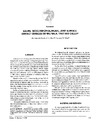Identificador persistente para citar o vincular este elemento:
https://accedacris.ulpgc.es/jspui/handle/10553/106667
| Título: | Equine metacarpophalangeal joint surface contact changes during walk, trot and gallop | Autores/as: | Vilar Guereño, José Manuel Pinedo, M. De Mier, J. Castejon, F. Riber, C. |
Clasificación UNESCO: | 310907 Patología | Fecha de publicación: | 1995 | Publicación seriada: | Journal of Equine Veterinary Science | Resumen: | Changes in the staining pattern for the metacarpophalangealjoint in the walking, trotting and galloping positions were studied. For this purpose, horse limbs from the third metacarpal bone distally were harvested and placed in the mid-stance position on a hydraulic press that applied the load required to obtain the palmar fetlock angles corresponding to the walking (218 degrees), trotting (226 degrees) and galloping positions (240 degrees), and a 1:1000 diluted aqueous dilution of methylene blue was injected into the fetlock joint. Based on the results, increasing the palmar fetlockangle in the anatomical specimen caused the contact zones of the proximal phalanx and the proximal sesamoidean bones with the third metacarpal bone joint surface to shift dorsally, thereby increasing the contact surface area between the involved bones. In the galloping position, the proximal phalanx wasfound to extend beyond the dorsal boundary of the third metacarpal bone joint surface and its basal portion to depart from the metacarpus in such a way that the distal sesamoidean ligaments forced the basilar zone of the proximal sesamoidean bones to separate. These phenomena may obviously assist in explaining the intricate biomechanics of the joint as well as its associated pathologies. | URI: | https://accedacris.ulpgc.es/handle/10553/106667 | ISSN: | 0737-0806 | DOI: | 10.1016/S0737-0806(06)81737-5 | Fuente: | Journal of Equine Veterinary Science [ISSN 0737-0806], v. 15(7), p. 315-319 |
| Colección: | Artículos |
Citas de WEB OF SCIENCETM
Citations
6
actualizado el 01-mar-2026
Visitas
51
actualizado el 11-ene-2026
Descargas
98
actualizado el 11-ene-2026
Google ScholarTM
Verifica
Altmetric
Comparte
Exporta metadatos
Los elementos en ULPGC accedaCRIS están protegidos por derechos de autor con todos los derechos reservados, a menos que se indique lo contrario.
